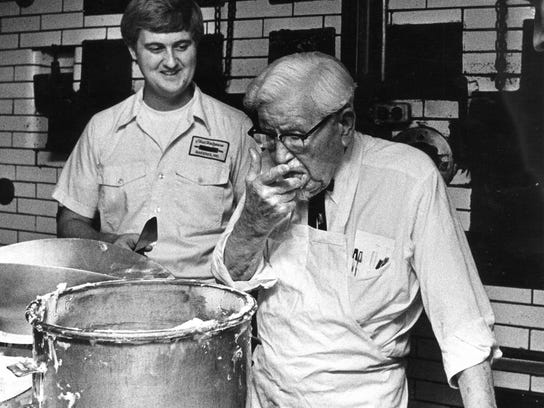
Colonel Harland Sanders always said his original fried chicken was so delicious because it was prepared from a “secret recipe of 11 herbs and spices.” Perhaps at one time the delectable batter-coating did contain 11 herbs and spices. Today, however, KFC (the company that now owns the Colonel’s name and secrets) may need to check their math. There’s a good chance the corporation has myth-calculated the number. In fact, after procuring a batch of the seasoning and having it analyzed, William Poundstone wrote in his 1983 book Big Secrets, the formula consists only of flour, salt, monosodium glutamate, and black pepper. (Hurray, at least pepper is a spice!)
We’re not bashing KFC — we still like their chicken — but we do wish to point out a truth. “Stuff” has a way of changing, not always for the better, and we often don’t even realize it. Or, to paraphrase an oft-used sentence, “What you think you see, is not necessarily what you get.”

We trust that when Colonel Sanders began franchising his famous Kentucky Fried Chicken, way back in the 1950s, he used “11 herbs and spices” (ingredients he insisted “stand on everyone’s kitchen shelf”). But times change, and apparently so does the truth — or does it?
Regardless how many are used, herbs and spices add flavor, aroma, color, texture and, often, nutrients to many recipes. [Time out. Do you know the difference between “herbs” and “spices”? C’est simple! Herbs are produced from the green leafy parts of certain plants. Spices are produced from parts of certain plants other than the leaves. Basil (from leaves) is an herb. Ginger (from the root) is a spice.]
Sanders, who devised many of the recipes and cooking processes used at his outlets, once said his signature gravy was so delicious, “You’ll want to throw away the chicken and eat the gravy.” However, after the Colonel sold the food chain to a big corporation, the gravy formula quickly changed — without prior warning. Sanders, staying on as spokesperson for a time, compared the new gravy to wallpaper paste. He was known, whenever he popped in to inspect one of the restaurants, to throw the gravy against the wall, and a few choice words (“colorful metaphors,” as Star Trek’s Mr. Spock once termed them) at the staff. Oh well. His name was on the product, after all; but he knew it was no longer the real deal.

Other things changed, too. For instance, Colonel Sanders always fried his chicken in pure vegetable oil, because he felt doing so yielded the best flavor. After purchasing the chain, KFC changed the cooking oil to save money. Soybean oil was substituted because it’s cheaper, albeit more fattening; but the corporation wasn’t exactly planning on publicizing their “fixes.” Again, we’re not necessarily faulting KFC. To succeed companies always have to watch their bottomline. Still, it’s nice to know when things change and exactly what you’re getting.
In good faith, Colonel Sanders shared his recipes and sold the use of his name. He imagined that wherever the words “Kentucky Fried Chicken” were displayed, and whoever prepared his signature food, that the same quality and ingredients were assured. Imagine his dismay when he visited various KFC restaurants, sampled the menu, researched the ingredients…. Isn’t anything sacred? Perhaps not these days.
In life, things change — often subtly — whether it’s in relationships or institutions, products or services. Sometimes substitutions are made. Things may look the same, sound the same, and even be labeled the same. But, as Colonel Sanders learned the hard way, regardless of the name, “chicken and gravy” ain’t always what you think; and the same can be said of everything, including misleading things you hear on the evening news and read on the internet, which people then innocently repost on social media. Face it, there’s a lot of misinformation in the world today.
Even what’s often touted as Spiritual or Biblical truth may actually be a misrepresentation of the Word of God or, worse, outright FALSE. An obvious example of this is the frequently repeated remark that “money is the root of all evil”? Sadly, this seemingly harmless misquoting of the Bible has done its fair share of damage. “Money” is a tool. With it you can build hospitals and save lives. As one evangelist once put it, “If money is truly the root of all evil, then the Devil would be delivering it to your doors by the truckloads.” No, the true Bible verse states, “…The love of money is a root of all kinds of evil, for which some have strayed from the faith in their greediness, and pierced themselves through with many sorrows.” (1 Timothy 6:10 NKJV)
There are countless other instances of spiritual error, in which people have purposely altered or entirely dismissed Biblical truth to support their own agendas. Many of these people misrepresent the teachings of Christ in order to justify a particular behavior or lifestyle that is contrary to God’s Word.
The Apostle Paul warned, “…A time is coming when people will no longer listen to sound and wholesome teaching. They will follow their own desires and will look for teachers who will tell them whatever their itching ears want to hear. They will reject the truth and chase after myths. But you should keep a clear mind in every situation….” (2 Timothy 4:3-5 NLT)
So, regardless of how it’s labeled, how it’s packaged, where it’s served — always trust but verify! Don’t swallow everything you hear. Know exactly what you’re “consuming.” What seems to be the “Colonel’s gravy” (truth) may actually be nothing more than some “concocted glop”! And that’s a grave (serious) thing to contemplate.
